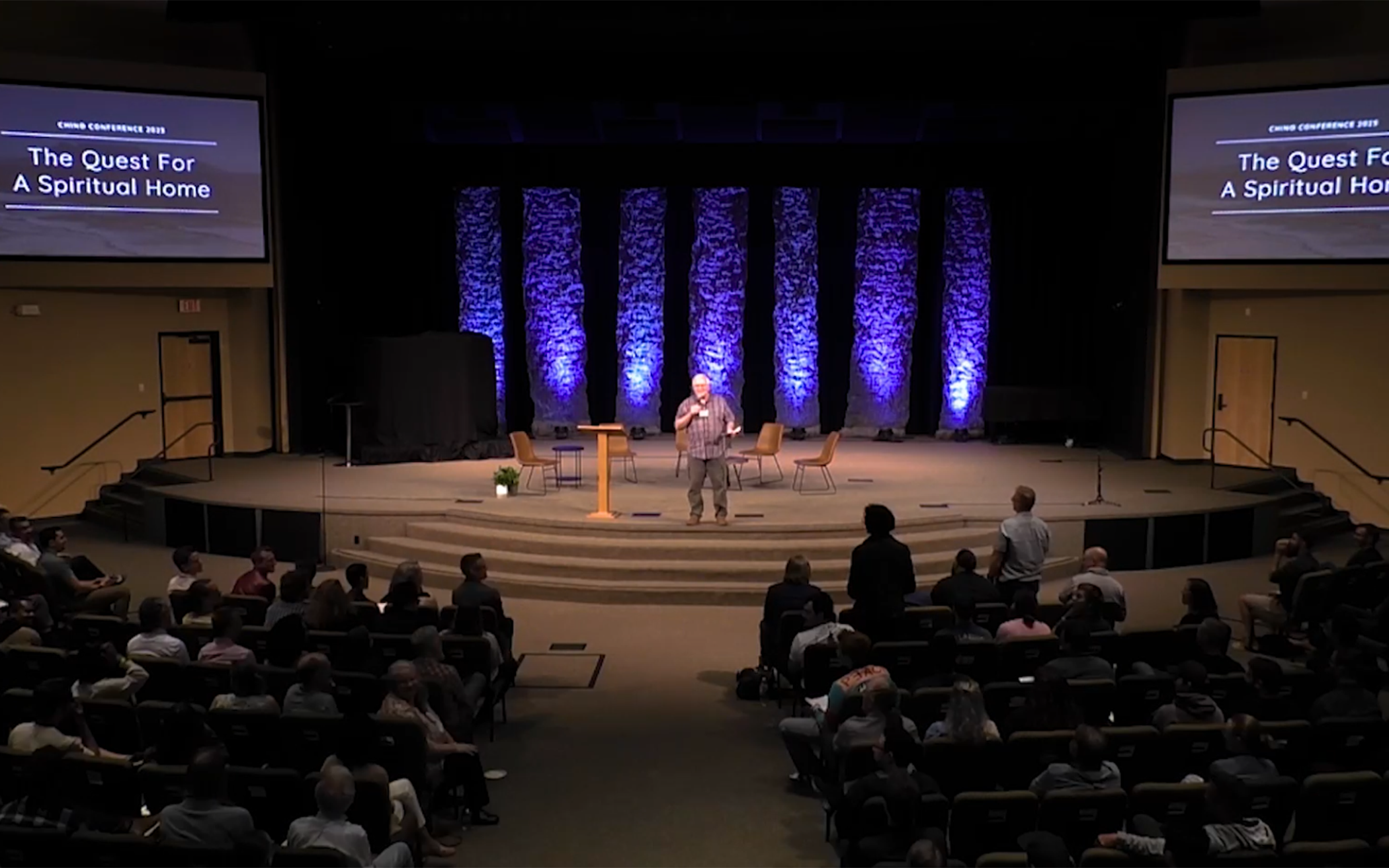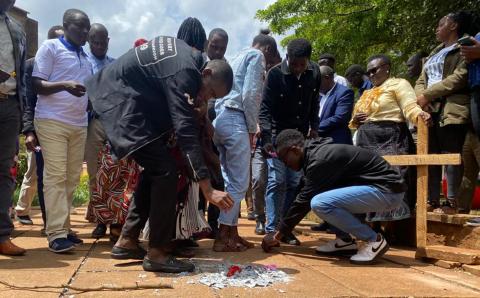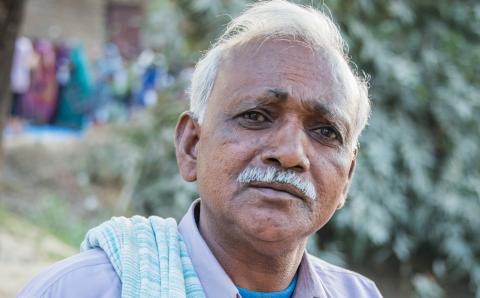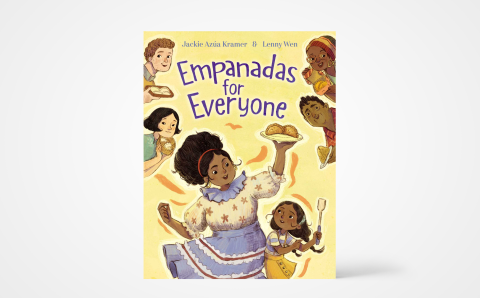If you live in California, New England, or a certain corner of the internet where Christian Reformed pastor Paul VanderKlay posts long, deep think pieces on the big questions of life, you might have heard of Estuary. It’s a place where things get stirred up and people who might have been alienated from Christians are finding themselves in fascinating conversations with them.
CrossPoint Church, a large, multilingual Christian Reformed congregation in Chino, Calif., is home to the Inland Empire Estuary meetup group. Meeting since 2021, this group is part of a growing number of groups that use the Estuary model to facilitate two-hour conversations on big questions the group chooses at each session.
Many Estuary groups meet in person; some meet online by video conference. The Chino group was started by John Vandonk, a former CRC pastor who is one of roughly 26,400 subscribers to Paul VanderKlay’s YouTube channel. VanderKlay is pastor of Living Stones CRC in Sacramento, Calif. Responding at first to things he found interesting about psychologist, author, and speaker Jordan Peterson, VanderKlay started a “thinking out loud” YouTube channel in 2009. He hosts conversations and commentaries on cultural happenings, movements in the CRC, and the intellectual explorations of people like the controversial Peterson, Awakening From the Meaning Crisis lecturer John Vervaeke, and The Symbolic World commentator Jonathan Pageau. Vandonk encouraged VanderKlay to find a way to extend and improve on the disjointed and disembodied conversations comment sections on social media are known for. Together they developed Estuary to be a place and a way to have those conversations.
In addition to meetup groups—24 are currently listed on estuaryhub.com—there have been conferences: in September 2022 in Thunder Bay, Ont., and in May 2023 in Chino, Calif. And Pleasant Street CRC in Whitinsville, Mass., hosted VanderKlay for a sample Estuary meeting Aug. 2.
The name “Estuary” was chosen because of the imagery it projects. In geography an estuary is where rivers meet the ocean. “It is a sometimes chaotic space where mighty currents may encounter crashing waves, where floods may change the boundaries, … where the water is neither fresh nor salt, but something in between, where shifting currents may alter the wetlands,” the CrossPoint website explains. Vandonk said Estuary is “a place for the exchange of ideas, where questions are encouraged, where judgment is not tolerated, and where finding answers is secondary to the journey.” The discussion groups use specific protocols to ensure that their conversations are fruitful, nonjudgmental, and well-run.
Vandonk said it’s common for a group to include a wide variety of viewpoints, backgrounds, and religions. He recalled a meeting earlier this year where there was an atheist, a few Christians, a Muslim, and a Jew all participating in the same conversation.
“The discussions we have are rooted around the bigger idea of what it is to be human; these are questions that every person of every tribe and religion is trying to answer,” Vandonk said.
The conversations are not purposely centered on spiritual or religious topics, but VanderKlay and Vandonk each said the discussions they’ve participated in usually turn in that direction because “that’s where the deep truths of what it is to be human lie.”
Vandonk said he doesn’t like to put too many labels on what Estuary is “because then it limits what it can become.” Estuaryhub.com offers this definition: “Estuary is a place where people come for conversation. Honest conversation. Not ideological warfare, memes, and trolling, but mutually respectful attempts to understand one another, and to learn to appreciate different perspectives and viewpoints. Estuary is a place where different ideas and ideologies meet. Where participants allow themselves to be exposed to new ways of thinking, where listening may be as important as talking, where being open to feedback will force you to hear yourself think.”
Although most Estuary groups on the Estuary Hub are in the U.S., there are some in Canada, Australia, Germany, and Greece, and new groups are popping up all the time. Many of the groups use Meetup, an online events calendar, to keep track of their gatherings. Leaders are encouraged to follow the protocols for conducting conversations so every group is run in a similar way. Leaders attend an online group to be introduced to the process, which Vandonk said is designed to ensure that the conversation does not become a debate about who is right or wrong and instead encourages mutual understanding and respect.
Spreading The Word
In August of 2022, VanderKlay and Vandonk took the Estuary concept on tour. They spent some time in Germany, introducing the conversation model in a festival format. It was an introduction for the uninitiated and encouragement for those who were already participating in online and in-person gatherings. VanderKlay’s online presence drew many interested people to the festival. “I’m somewhat of a celebrity,” he said, “albeit only in one specific corner of the vastness that is the internet. It is a great pleasure to meet people face to face after having shared many conversations with them via comment sections and forums.”
After the trip, Vandonk, VanderKlay, and other festival speakers talked about their experiences on VanderKlay’s podcast.
A month later, several Estuary leaders and subscribers gathered in Thunder Bay, Ont., for a four-day event on Consciousness and Conscience. That successful conference sparked plans for an event this past May in Chino, “The Quest for a Spiritual Home,” which featured lectures, a tour of a Greek Orthodox church, and an afternoon of paintball. One of the conference attendees, Moises Pacheco, pastor at Grace in Garfield CRC in Chicago, Ill., said, “The lectures and the panel discussions were really insightful. Having a couple of Protestants, an Orthodox artist, and a non-Christian cognitive scientist all talking about a spiritual home and seeing similar things and giving common language for it to (speak to) people from all over is something important.”
Pacheco said that while many of the talks can be viewed online, the way most conference attendees usually consume content, “the embodied nature of the conference gave the opportunity to do some things that are likely not common in an academic conference or even a religious conference with this level of intellectualism.”
Vandonk said that many attendees expressed gratitude for the opportunity to meet people from different walks of life, different religions, and different backgrounds all coming together in an effort to broaden their understanding. Pacheco shared how one evening he, a Protestant pastor, ended up on stage singing “Leaning on the Everlasting Arms” with a Sikh man who “seemed to know the song better than I did.”
Nothing Quite Like It
VanderKlay and Vandonk share a passion for Estuary, believing there is nothing else like it around today. “In a world of cancel culture, groupthink, and binary thinking,” VanderKlay said, “a space for the free exchange of ideas and experiences with fellow humans is a cool breeze on a hot day, a gentle rain falling on a parched landscape.”
Lon Wagner, pastor of discipleship at CrossPoint CRC in Chino, called Estuary “a ministry of the church, but not for the church,” recognizing it instead as a place for people to ask questions and explore in ways they might not be comfortable doing or able to do in regular Sunday morning services.
VanderKlay would love to see every church have an Estuary group. In a YouTube video describing his vision, he said churches have a long history of hosting various kinds of not-specifically-religious groups like Alcoholics Anonymous, other recovery groups, or community groups, and they’d benefit from welcoming the spectrum of people Estuary groups attract.
“Churches are too insular. Churches don’t know what’s going on in the hearts and minds of the people around them too often,” VanderKlay said. “Churches need these kinds of credible conversations that are on the edge.”
About the Author
Dan Veeneman works in the dairy industry as a ventilation specialist. He lives in Abbotsford, B.C., with his wife and three children. He is a member of Gateway Community Church.








